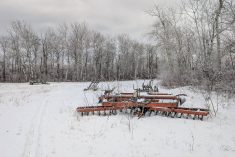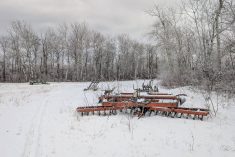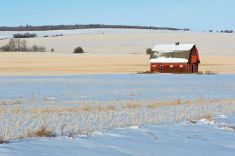Ottawa’s proposal for an improved AgriStability program could give farmers short-term gain for long-term pain, Manitoba’s agriculture minister Blaine Pedersen warns.
At the online federal-provincial-territorial agriculture ministers’ meeting on Friday, federal Agriculture Minister Marie Claude Bibeau proposed dropping AgriStability’s maximum reference margin, and increasing the compensation rate from 70 to 80 per cent retroactively this year and for calendar 2021 and 2022.
“Taken together, these changes would increase the overall amount AgriStability pays out to farmers by 50 per cent,” the federal government said in a news release.
Read Also

U.S. grains: Soy rally continues after Trump says China to expand purchases
Chicago | Reuters – Chicago soybeans extended gains on Thursday, a day after U.S. President Donald Trump said China had…
Like other provinces, Manitoba is studying Bibeau’s proposal, which would cost the province at least $15 million more a year, Pedersen said.
But what Ottawa is offering farmers might hurt them more in the long run, he added.
At the meeting’s close Bibeau said farm support “payments are going to rich farmers only,” according to Pedersen. He interpreted that to mean under the next five year federal-provincial Canadian Agricultural Partnership, due to begin April 1, 2023, Bibeau’s plan is to cut spending on other farm support programs, including AgriInsurance and AgriInvest.
“(T)he federal government seems to have implied they are putting out something now but they are going to claw back the money later and that’s our big concern,” Pedersen said. “We want to look at the long-term stability of farm programs to make sure that they are bankable, that they are timely and that they work for the farm community.
“Be careful what you ask for…”
The federal government’s AgriStability proposal shows it wants to invest in farm supports, not cut them, a spokesperson from Bibeau’s office stated in an email Tuesday.
“She has put a concrete offer on the table for the provinces to consider,” the official wrote. “She is trying to find a national consensus to boost the amount AgriStability pays out to farmers by 50 per cent for 2020 and ongoing.
“Formal consultations on the direction of the next policy framework have not even started yet, and it is far too early to imply anything otherwise. All levels of government have a chance to listen to farmers today and step up to meaningful and immediate reforms that will significantly improve the lives of farmers.”
While Pedersen said Manitoba will closely review Bibeau’s AgriStability proposal, he’s also asking farmers to consider four other options, including a margin-based insurance program that could replace AgriStability.
Details need to be worked out, but farm income could be stabilized by insuring farm margins with governments and farmers sharing the premium costs, Pedersen said.
Keystone Agricultural Producers (KAP) wants to see more details before endorsing that plan, president Bill Campbell said in an interview.
Bibeau’s AgriStability proposal looks promising, he added.
“I think if some of the issues were addressed and fixed it wouldn’t necessarily be a broken program,” he said, in response to Pedersen’s critique of AgriStability.
Canadian farmers have been advocating for AgriStability improvements since 2013 when the Harper government changed it. Campbell said he’s frustrated Ottawa’s proposal took so long.
“Nobody could counter-offer or object until something was on the table,” he said. “Now it’s going to take another three or four months to figure it out.”
Agriculture can play a role in boosting Canada’s economy post-COVID, but the industry needs income stabilization to realize its potential, Campbell said.
Check out the Dec. 10 issue of the Manitoba Co-operator for more details on this story.
— Allan Dawson is a reporter for the Manitoba Co-operator at Miami, Man.
















